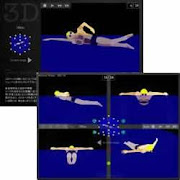 Numerous websites and blogs discussed the "dirty tactics" of the Olympic open water swimmers in Beijing after newspapers reported that Cassandra Patten of the U.K. angrily accused Germany's Angela Maurer of unsportsmanlike conduct in the frantic sprint at the end of the Olympic 10K Marathon Swim.
Numerous websites and blogs discussed the "dirty tactics" of the Olympic open water swimmers in Beijing after newspapers reported that Cassandra Patten of the U.K. angrily accused Germany's Angela Maurer of unsportsmanlike conduct in the frantic sprint at the end of the Olympic 10K Marathon Swim.AP photo on left shows Cassandra Patten upset with fourth-place Maurer immediately after the Olympic 10K Marathon Swim in Beijing.
Patten, the bronze medalist, finished only a few strokes behind Russian winner Larisa Ilchenko and fellow Brit Keri-Anne Payne after setting an unrelenting pace for 10 kilometers (a bit faster than 1 minute 12 seconds per 100 meters without the benefits of wall turns).
But Patten also claimed fourth-placed Maurer grabbed her ankles towards the end of the gruelling two-hour race. Patten said: "I was really annoyed. It's not good sportsmanship to pull on someone's feet. What is all that about?"
The race appeared to be remarkably fair and clean given the pressure on the athletes and the stakes up for grab.
The head referee, Dennis Miller of Fiji, was constantly well-positioned in the official's boat very close to the lead pack throughout the race with a great vantage point.
There were a total of five yellow cards given in the race. Fortunately, none of these yellow cards affected the ultimate outcome of the race. If there HAD BEEN a pulling back of one's ankles, either Miller or one of the two assistant referees (also well-positioned in the official's boats along the course) would have caught the infraction.
When a world-class swimmer is pulled back by her ankles, the loss of momentum is immediately and easily seen by the referees. There appeared to be little evidence of pulling back or other obvious acts of unsportsmanlike conduct. That being said, it is also obvious and widely known that the swimmers do bang into each other, frequently hitting arms and touching the feet of the swimmer inmediately in front of them.
As Payne writes in her blog, "As for [Ilchenko], she swam a great race[.] there were no pulling on legs - just annoying tapping on feet for 9.5k's but she would have had the same from the girls behind her, so it didnt bother me."
The banging, elbowing and scraping are all examples of incidental contact that is tolerated in the sport. From the athlete's perspective, a brushing against another swimmer or an interlocking of arms at the 1K mark is remarkably different than the same physical contact at the 9K mark because (1) they are physically and mentally exhausted and (2) everything is amplified during the final sprint.
Towards the end of the Olympic 10K Marathon Swim, Maurer could be seen trying to get around Cassandra Patten. Angela swam to her right, then to her left, then behind Ilchenko, then back behind Patten again to no avail. Patten did a great job holding her off.
It was clear that Maurer was trying to make a move, but did nothing illegal or unsportsmanlike in her tactics. Patten was not impeded in the opinions of the three referees who were only a few meters away from the action.
That being said, the gold medalist Larisa Ilchenko swam wide of Payne and Patten when she made her final move towards the end. This was a classic and clever move by the undefeated world champion. It created an area of separation that enabled Ilchenko to sprint ahead in clean water and prevented Payne and Patten from closing in on her.
 At no level in open water swimming - either on the international level, the pro races or competitive domestic races - is pulling back, elbowing, punching or other forms of unsportsmanlike conduct encouraged or taught by responsible coaches. That being said, protecting oneself and incidental contact is the name of the game as can be seen by the photo to the right. This photo was taken by Javier Blazquez at the 2008 World Open Water Swimming Championships women's 5K race just at the time the American swimmer was sandwiched between several rivals near the first buoy turn.
At no level in open water swimming - either on the international level, the pro races or competitive domestic races - is pulling back, elbowing, punching or other forms of unsportsmanlike conduct encouraged or taught by responsible coaches. That being said, protecting oneself and incidental contact is the name of the game as can be seen by the photo to the right. This photo was taken by Javier Blazquez at the 2008 World Open Water Swimming Championships women's 5K race just at the time the American swimmer was sandwiched between several rivals near the first buoy turn.




















No comments:
Post a Comment